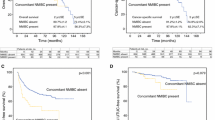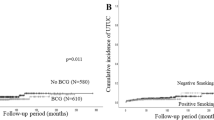Abstract
Introduction
Our aim is to evaluate whether previous non-urothelial malignant history affects the clinical outcomes of patients with non-muscle invasive bladder cancer (NMIBC).
Patients and Methods
We identified 1097 cases treated by transurethral resection of bladder tumors for initially diagnosed NMIBC at our four institutions between 1999 and 2017. We compared clinical characteristics and outcomes between NMIBC patients with and without previous non-urothelial malignant history and investigated whether smoking status and treatment modality for previous cancer affected NMIBC outcomes.
Results
A total of 177 patients (16.1%) had previous non-urothelial malignant history (malignant history group). The 5-year recurrence-free survival rate and the 5-year progression-free survival rate in the malignant history group was 46.4% and 88.3%, respectively, which was significantly lower than that in the counterpart (60.2% p = 0.004, and 94.5% p = 0.002, respectively). A multivariate Cox regression analysis identified previous non-urothelial malignant history as an independent risk factor for tumor recurrence (p = 0.001) and stage progression (p = 0.003). In a subgroup of patients who were current smokers (N = 347), previous non-urothelial malignant history was associated with tumor recurrence and stage progression. In contrast, previous non-urothelial malignant history was not associated with tumor recurrence or stage progression in ex-smokers or non-smokers. In a subgroup analysis of NMIBC patients with previous prostate cancer history, those treated with androgen deprivation therapy had a significantly lower bladder tumor recurrence rate than their counterparts (p = 0.027).
Conclusions
Previous history of non-urothelial malignancy may lead to worse clinical outcome in patients with NMIBC, particularly current smokers.



Similar content being viewed by others
References
DeGeorge KC, Holt HR, Hodges SC. Bladder cancer: diagnosis and treatment. Am Fam Phys. 2017;96:507–14.
Kamat AM, Hahn NM, Efstathiou JA, et al. Bladder cancer. Lancet. 2016;388:2796–810.
Keegan THM, Bleyer A, Rosenberg AS, Li Q, Goldfarb M. Second primary malignant neoplasms and survival in adolescent and young adult cancer survivors. JAMA Oncol. 2017;3:1554–7.
Deng L, Harðardottír H, Song H, et al. Mortality of lung cancer as a second primary malignancy: a population-based cohort study. Cancer Med. 2019;8:3269–77.
Anderson JK, Alanee S, Lindgren B, Slaton J. The risk of bladder cancer in patients diagnosed with other primary neoplasms: analysis of the SEER database. Urol Oncol. 2013;31:862–5.
Bermejo JL, Sundquist J, Hemminki K. Bladder cancer in cancer patients: population-based estimates from a large Swedish study. Br J Cancer. 2009;101:1091–9.
Aljabery F, Liedberg F, Häggström C, et al. Treatment and prognosis of bladder cancer patients with other primary cancers. A nationwide population-based study in the Bladder Cancer Data Base Sweden (BladderBaSe). BJU Int. 2020;126(5):625–32. https://doi.org/10.1111/bju.15198.
Wood ME, Vogel V, Ng A, Foxhall L, Goodwin P, Travis LB. Second malignant neoplasms: assessment and strategies for risk reduction. J Clin Oncol. 2012;30:3734–45.
Catto JW, Xinarianos G, Burton JL, Meuth M, Hamdy FC. Differential expression of hMLH1 and hMSH2 is related to bladder cancer grade, stage and prognosis but not microsatellite instability. Int J Cancer. 2003;105:484–90.
Sanguedolce F, Cormio A, Massenio P, et al. Altered expression of HER-2 and the mismatch repair genes MLH1 and MSH2 predicts the outcome of T1 high-grade bladder cancer. J Cancer Res Clin Oncol. 2018;144:637–44.
Varol U, Kucukzeybek Y, Alacacioglu A, et al. BRCA genes: BRCA 1 and BRCA 2. J BUON. 2018;23:862–6.
Pilarski R. The role of BRCA testing in hereditary pancreatic and prostate cancer families. Am Soc Clin Oncol Educ Book. 2019;39:79–86.
Baretta Z, Mocellin S, Goldin E, Olopade OI, Huo D. Effect of BRCA germline mutations on breast cancer prognosis: a systematic review and meta-analysis. Medicine (Baltimore). 2016;95:4975–83. https://doi.org/10.1097/MD.0000000000004975.
Weinstein J, Akbani R, Broom B, et al. Comprehensive molecular characterization of urothelial bladder carcinoma. Nature. 2014;507:315–22.
Stracci F, D’Alò D, Cassetti T, Scheibel M, Rosa FL. Incidence of multiple primary malignancies in women diagnosed with breast cancer. Eur J Gynaecol Oncol. 2009;30:661–3.
Meeks JJ, Carneiro BA, Pai SG, et al. Genomic characterization of high-risk non-muscle invasive bladder cancer. Oncotarget. 2016;7:75176–84.
Begg CB, Zhang ZF, Sun M, Herr HW, Schantz SP. Methodology for evaluating the incidence of second primary cancers with application to smoking-related cancers from the Surveillance, Epidemiology, and End Results (SEER) program. Am J Epidemiol. 1995;142:653–65.
Tabuchi T, Ito Y, Ioka A, Nakayama T, Miyashiro I, Tsukuma H. Tobacco smoking and the risk of subsequent primary cancer among cancer survivors: a retrospective cohort study. Ann Oncol. 2013;24:2699–704.
Jin Z, Gao F, Flagg T, Deng X. Nicotine induces multi-site phosphorylation of Bad in association with suppression of apoptosis. J Biol Chem. 2004;279:23837–44.
Nishioka T, Kim HS, Luo LY, Huang Y, Guo J, Chen CY. Sensitization of epithelial growth factor receptors by nicotine exposure to promote breast cancer cell growth. Breast Cancer Res. 2011;13:113–23. https://doi.org/10.1186/bcr3055.
Xu J, Huang H, Pan C, Zhang B, Liu X, Zhang L. Nicotine inhibits apoptosis induced by cisplatin in human oral cancer cells. Int J Oral Maxillofac Surg. 2007;36:739–44.
Yuge K, Kikuchi E, Hagiwara M, et al. Nicotine induces tumor growth and chemoresistance through activation of the PI3K/Akt/mTOR pathway in bladder cancer. Mol Cancer Ther. 2015;14:2112–20.
Fahmy M, Mansure JJ, Brimo F, et al. Relevance of the mammalian target of rapamycin pathway in the prognosis of patients with high-risk non-muscle invasive bladder cancer. Hum Pathol. 2013;44:1766–72.
Izumi K, Taguri M, Miyamoto H, et al. Androgen deprivation therapy prevents bladder cancer recurrence. Oncotarget. 2014;5:12665–74.
Kim A, Kim MS, Ahn JH, et al. Clinical significance of 5-alpha reductase inhibitor and androgen deprivation therapy in bladder cancer incidence, recurrence, and survival: a meta-analysis and systemic review. Aging Male 2019; 1-8.
Shiota M, Kiyoshima K, Yokomizo A, et al. Suppressed recurrent bladder cancer after androgen suppression with androgen deprivation therapy or 5alpha-reductase inhibitor. J Urol. 2017;197:308–13.
Lombard AP, Mudryj M. The emerging role of the androgen receptor in bladder cancer. Endocr Relat Cancer. 2015;22:265–77.
Li P, Chen J, Miyamoto H. Androgen receptor signaling in bladder cancer. Cancers (Basel). 2017;9:20–33. https://doi.org/10.3390/cancers9020020.
Author information
Authors and Affiliations
Corresponding author
Ethics declarations
Disclosure
No conflict of interest.
Additional information
Publisher's Note
Springer Nature remains neutral with regard to jurisdictional claims in published maps and institutional affiliations.
Rights and permissions
About this article
Cite this article
Kufukihara, R., Kikuchi, E., Ogihara, K. et al. Role of Previous Malignancy History in Clinical Outcomes in Patients with Initially Diagnosed Non-Muscle Invasive Bladder Cancer. Ann Surg Oncol 28, 5349–5359 (2021). https://doi.org/10.1245/s10434-021-09750-0
Received:
Accepted:
Published:
Issue Date:
DOI: https://doi.org/10.1245/s10434-021-09750-0




